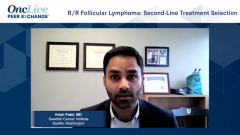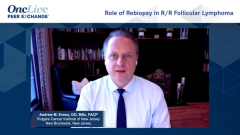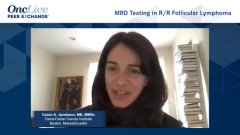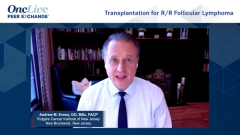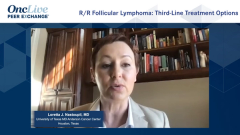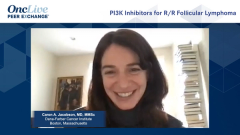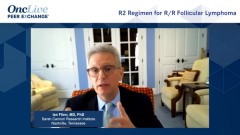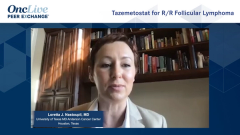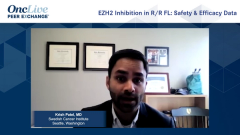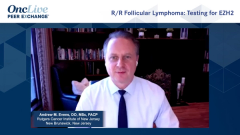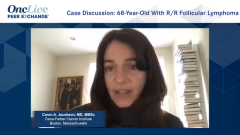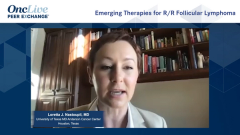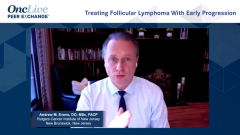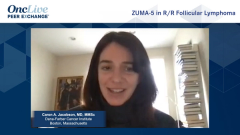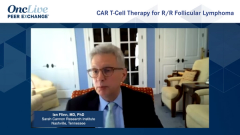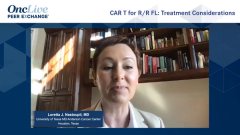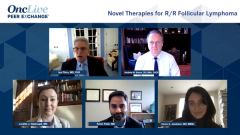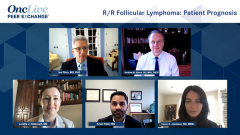
R/R Follicular Lymphoma: Patient Prognosis
Insight regarding the prognosis for patients with follicular lymphoma who relapse and impact of treatment sequencing on this trajectory.
Episodes in this series

Ian Flinn, MD, PhD: Hello, and welcome to this OncLive® Peer Exchange® titled “Clinical Updates on Relapsed/Refractory Follicular Lymphoma: Where We Are Now and What Is Coming Next.”
I am Dr Ian Flinn, from the Sarah Cannon research institute in Nashville, Tennessee. Joining me today in this discussion are my colleagues Dr Caron Jacobson, from the Dana-Farber Cancer Institute in Boston, Massachusetts; Dr Andrew Evens, from the Rutgers Cancer Institute of New Jersey; Dr Loretta Nastoupil, from the University of Texas MD Anderson Cancer Center in Houston; and Dr Krish Patel, from the Swedish Cancer Institute in Seattle, Washington.
Today we are going to highlight a number of topics pertaining to systemic treatment for relapsed and refractory follicular lymphoma. We will consider the impact of recent clinical trial data on clinical decision-making, including from the 2020 ASH [American Society of Hematology] Annual Meeting. Let’s get started with our first topic.
Caron, let’s start with a general discussion on prognosis for patients with follicular lymphoma in general. Maybe you can indicate the prognosis for patients who relapse after frontline therapy and highlight the time course to relapse for patients.
Caron A. Jacobson, MD, MMSc: Thanks, Ian. This is obviously a really important question when we’re thinking about the treatment landscape for follicular lymphoma. It’s important to remember that most patients with follicular lymphoma have an excellent prognosis. About 75% to 80% of newly diagnosed patients with follicular lymphoma will do great with initial observation, or frontline chemoimmunotherapy, or more recently, a CD20 blockade with lenalidomide therapy. Many patients have very long natural histories—on average, 20 to 30 years at a time.
We do expect that given enough time, patients with follicular lymphoma will relapse. But depending on age at diagnosis and when treatment is needed, that may or may not happen over the course of the history with this illness, and you may or may not need second-line therapy.
We do know that about a quarter of patients with follicular lymphoma—about 20% to 25% of patients by a number of prognostic indices, or markers, or factors—do less well and have a more aggressive course. A lot of what we’re going to talk about today has really important implications for those patients, because they’re not the ones who have these 20- to 30-year natural histories.
Ian Flinn, MD, PhD: Thank you, Caron.
Andy, Caron was pointing out the natural of this disease. There are some people who do less well compared with others. Many, fortunately, do very well with this disease. But we do know that with each subsequent therapy, the prognosis may change. How do you look at that? Also, does that affect subsequent therapies and what you use to treat patients?
Andrew M. Evens, DO, MSc, FACP: Ian, thank you. Those are 2 very important questions. I’ll take the first 1, in terms of prognosis changing over time with subsequent relapses. The quick answer is, yes, there are historical data saying that the first remission is usually the longest. With each subsequent treatment, those remissions are shorter and shorter.
There are some recent data to help guide us. Memorial Sloan Kettering Cancer Center published on this a few months ago. This was a data set of about 1000 patients. It was from 1998 to 2009, so it doesn’t include the contemporary era with some of the new therapies. What they showed was that the first remission was more than 8 years. But at that second remission, the median PFS [progression-free survival] was only a little over a year, or a year and a half. Then the third was a year, and the fourth was a little less. So it definitely decreases with time.
The hope is that we can change or improve that with the new and novel therapies that we’ll talk about later. In terms of the sequencing aspect, does it affect that trajectory? I’m not sure it does. Or at least there are not great data to support it. An exception to that may be for the patient who we think about a stem cell transplant for, whether autologous or allogeneic.
Transcript Edited for Clarity


